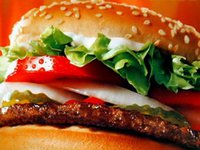McDonald's food likely to be banned in Russia
The production and sales of some of McDonald's products is likely to be banned In Russia. Legal sanctions may affect cheeseburgers and royal cheeseburgers, filet-o-fish, chicken burgers, ice cream with berry fillings and milkshakes. Such requirements were submitted to the Tverskoy Court of Moscow from the Russian Federal Service for Consumer Rights (Rospotrebnadzor) in the Novgorod region, RIA Novosti reports.

Representatives of Rospotrebnadzor said that the content of fat, protein and carbohydrates in these product did not correspond to the data indicated in information sheets. The violation was revealed as a result of a routine checkup conducted in May of this year in two restaurants of the chain in the city of Novgorod. Inspection officers found significant violations of the law, the lawsuit says.
The hearings on the case will be held in August. The restaurants, where the violations were found, are likely to be closed before the trial starts.
However, Rospotrebnadzor officials in Novgorod said that the department was not going to ban the entire production and sales of McDonald's in Russia. The head of the regional department, Anatoly Rossolovsky, said that the department only required the company should inform consumers properly about the amount of fats and carbohydrates in food products, ITAR-TASS said.
Spokespeople for McDonald's Russia said, though, that the company had not received any complaints from Rospotrebnadzor, nor had it received any information about the lawsuit. According to the corporation, all the food in the restaurants of the chain is produced in accordance with methods approved by the Russian authorities.
McDonald's had been repeatedly accused of misleading customers in the information about food ingredients. A few years ago, it was reported that laboratory experts at the Institute of Nutrition o the Russian Academy of Sciences, who examined the content of a milkshake from the food chain, said that it contained vegetable oils, including unhealthy palm oil. The experts found that there were no dangerous preservatives used in the restaurants of the chain, but the norm of salt, sugar and fat was above the norm.
Recently, McDonald's in China was suspected of selling of expired products. Reportedly, Shanghai Husi Ltd was supplying expired meat, which was then used for the production of McDonald's burgers.
In the wake of the Ukrainian crisis, several McDonald's restaurants were closed in the Crimea, after the peninsula reunited with Russia. Afterwards, the head of the Liberal Democratic Party of Russia, Vladimir Zhirinovsky, who is known for his aversion for McDonald's food since the 1990s, offered to close all restaurants of the chain in Russia.
Reportedly, the Crimean Peninsula will have RusBurger restaurants instead. This is a Russian fast-food chain that uses only Russian, environmentally friendly products. The chain takes account of regional and national preferences of the population of the Russian Federation, the website of the company says.
Noteworthy, deputy head of the Committee for Budget and Taxes, Oksana Dmitrieva, told ITAR-TASS that the decision to close the network of McDonald's restaurants in Russia could be only a political decision. "This issue is not economic, but a political one, and such an initiative may only come from the president," she said.
Deputy head of the Committee for Agriculture, Nadezhda Shkolkina, (United Russia), on the contrary, believes that "this is an issue of junk food, not politics."
Pravda.Ru
Subscribe to Pravda.Ru Telegram channel, Facebook, RSS!





